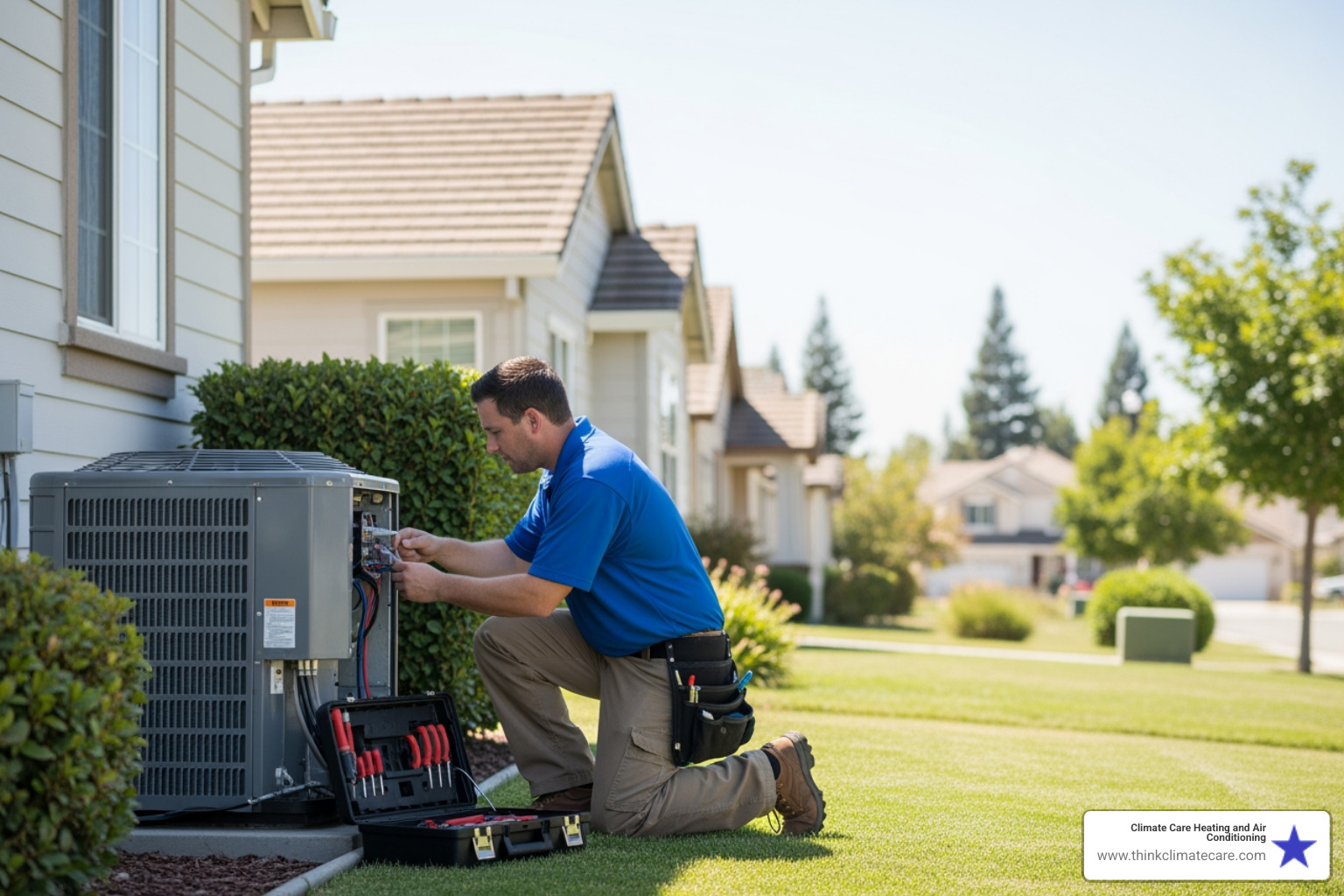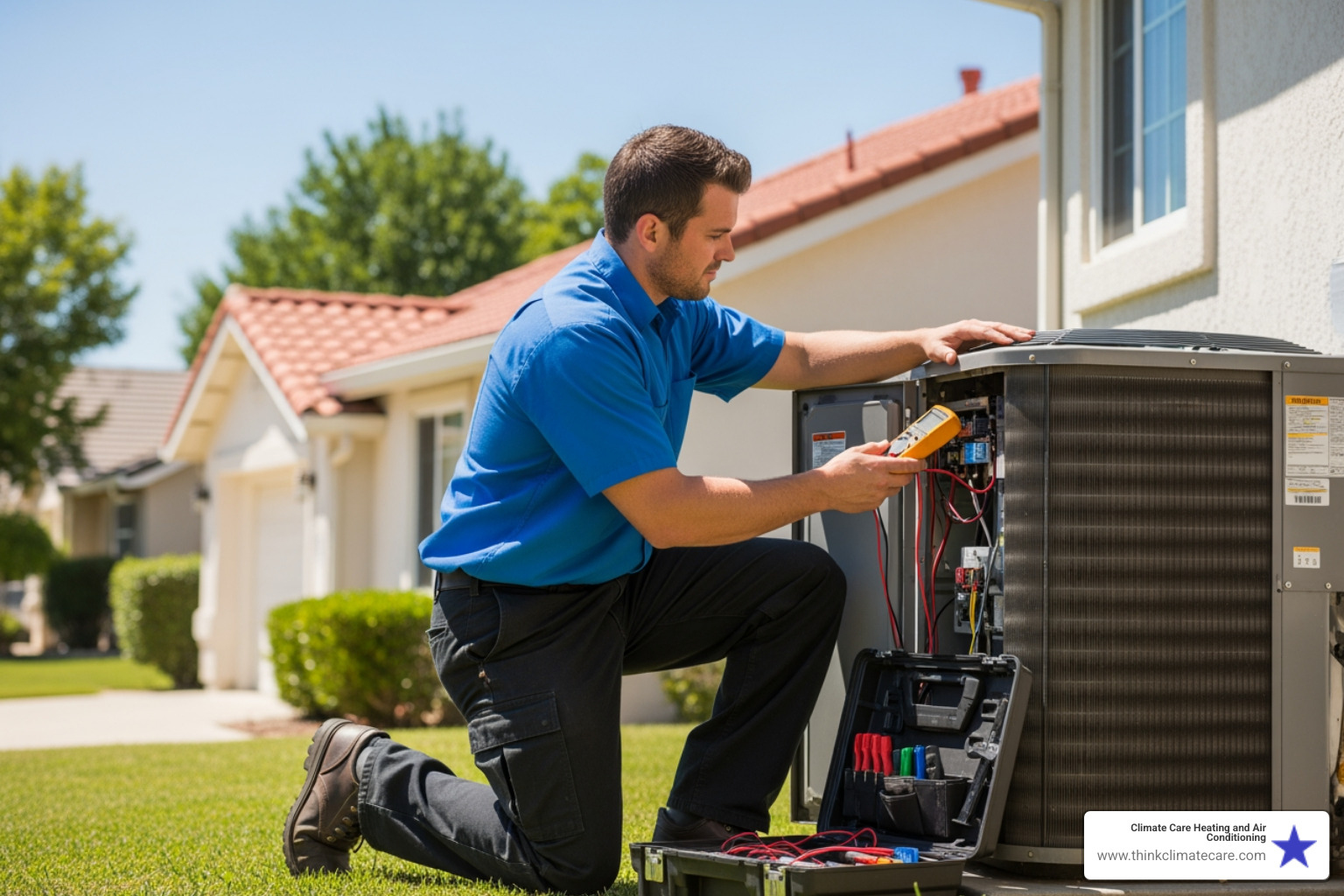Your Guide to Air Conditioner Maintenance
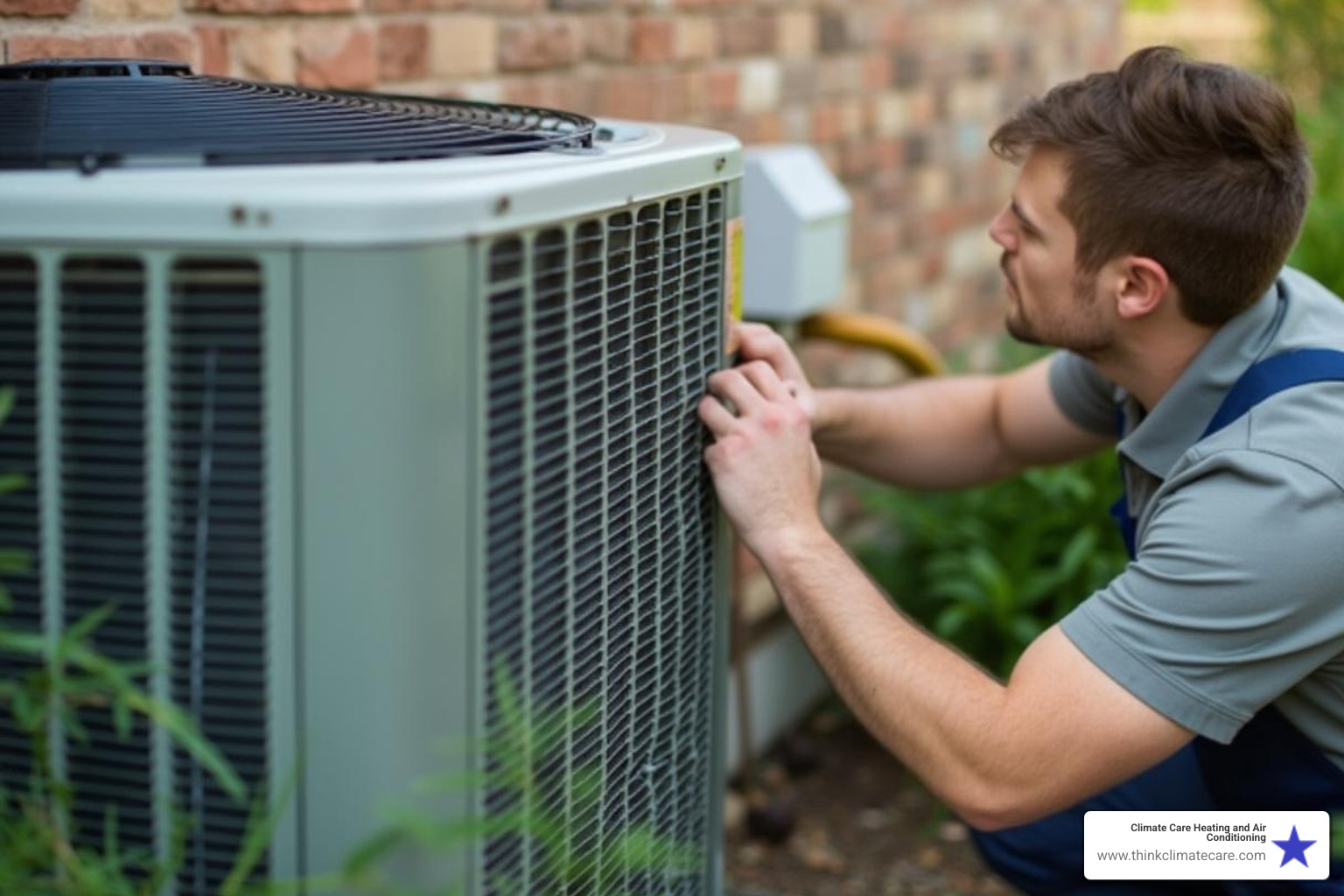
Why Regular Air Conditioner Maintenance Matters
Following essential AC maintenance tips keeps your cooling system running efficiently, preventing costly breakdowns. Regular care can reduce energy bills by up to 15%, extend your system's lifespan, and ensure consistent comfort.
Quick AC Maintenance Checklist:
- Change filters monthly during cooling season.
- Clean outdoor unit by removing debris and maintaining 24-inch clearance.
- Check thermostat settings and program for energy savings.
- Inspect condensate drain to clear clogs and prevent water damage.
- Schedule professional tune-ups annually before peak season.
- Straighten coil fins with a fin comb to restore airflow.
- Monitor system performance for unusual noises or odors.
During Manteca's hot summers, neglected maintenance often leads to expensive emergency repairs. A dirty filter alone can increase energy use by 15%, and a clogged drain can cause water damage.
Fortunately, most basic maintenance is simple enough for homeowners. Proactive care saves money on utilities and prevents breakdowns during peak heat. It also improves your home's air quality by removing dust and allergens, creating a healthier environment for your family.

Essential DIY AC Maintenance Tips for Homeowners
Most essential ac maintenance tips are simple DIY tasks that keep your AC running smoothly and prevent costly repairs. A little regular attention goes a long way. Here are the key maintenance steps that make the biggest difference.
Step 1: Safety First - Shut Off The Power
Before performing any maintenance, you must turn off the power for your safety. For central air, use the exterior shut-off box near the outdoor unit, then flip the corresponding breaker in your main electrical panel to "off." This double protection is essential.

For a window unit, simply unplug it. This step eliminates the risk of electric shock and is the most important of all ac maintenance tips. If you have frequent breaker issues, our guide on AC circuit breaker problems can help.
Step 2: Clean or Replace Your Air Filter
Your air filter protects your indoor coil from dirt. A clogged filter forces your system to work harder, so check it monthly during cooling season (May-August in California), especially if you have pets or live in a dusty area. Replace disposable filters every 1-2 months of heavy use.
Filters are usually located along the return ductwork near the indoor air handler or behind a large return air vent. Window unit filters are behind the front grille.
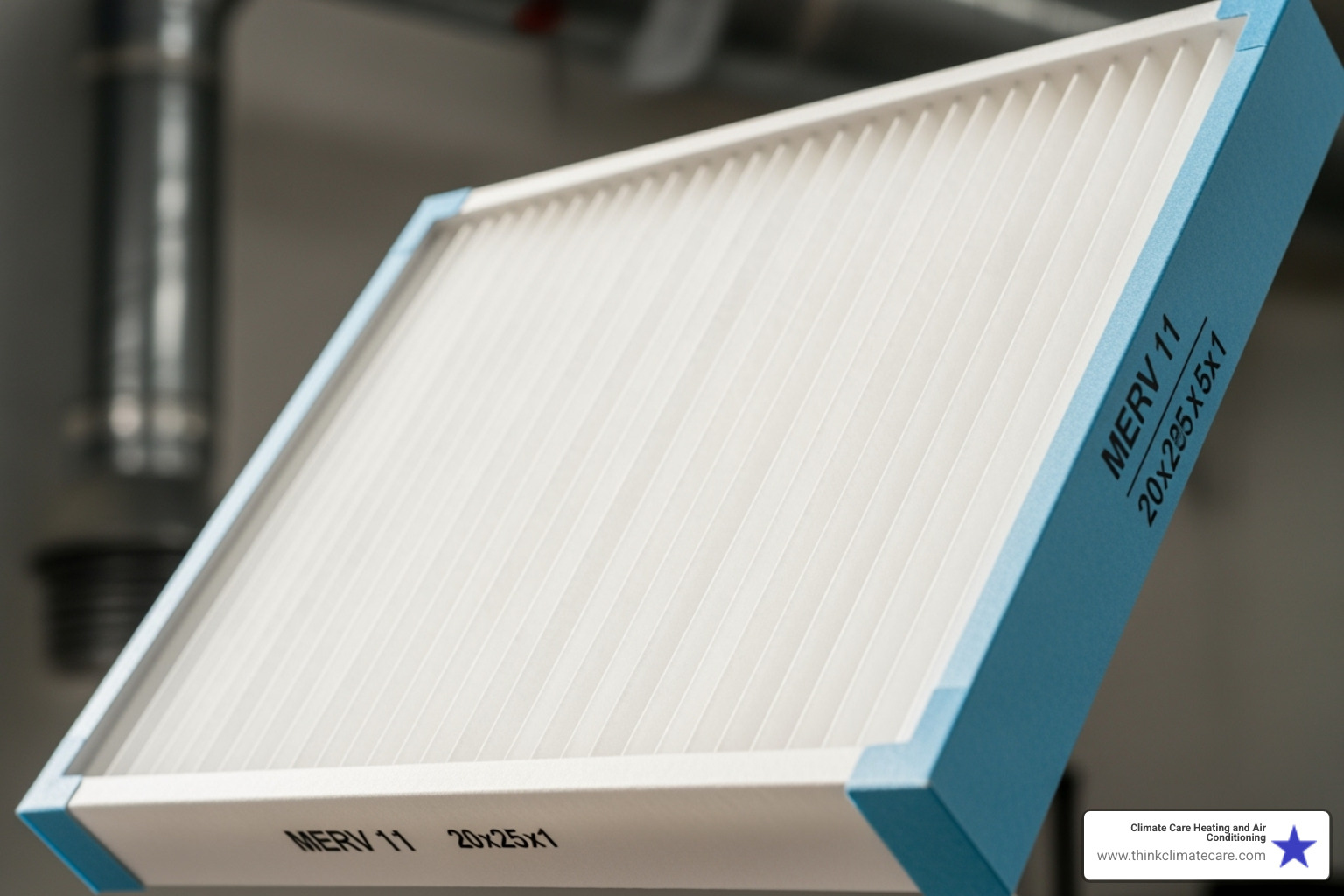
A clogged filter can increase your energy bills by 15%, cause uneven cooling, and reduce indoor air quality. The extra strain can also lead to breakdowns.
Check your owner's manual for the recommended MERV rating (typically 1-12 for home systems). Using a filter with too high a rating can restrict airflow and cause your coil to freeze.
If you have a washable filter, clean it with water and white vinegar, rinse, and let it dry completely before reinstalling to prevent mold. Learn more in our guide on the Impact of Dirty Filters on AC Performance.
Step 3: Clean the AC Coils and Fins
Your AC has two coils: the indoor evaporator coil absorbs heat, and the outdoor condenser coil releases it. Both must be clean to work efficiently. The outdoor coil is exposed to leaves and debris, while the indoor coil can accumulate dust over time.
Both coils have delicate aluminum fins that maximize heat transfer. Bent fins block airflow and reduce efficiency.
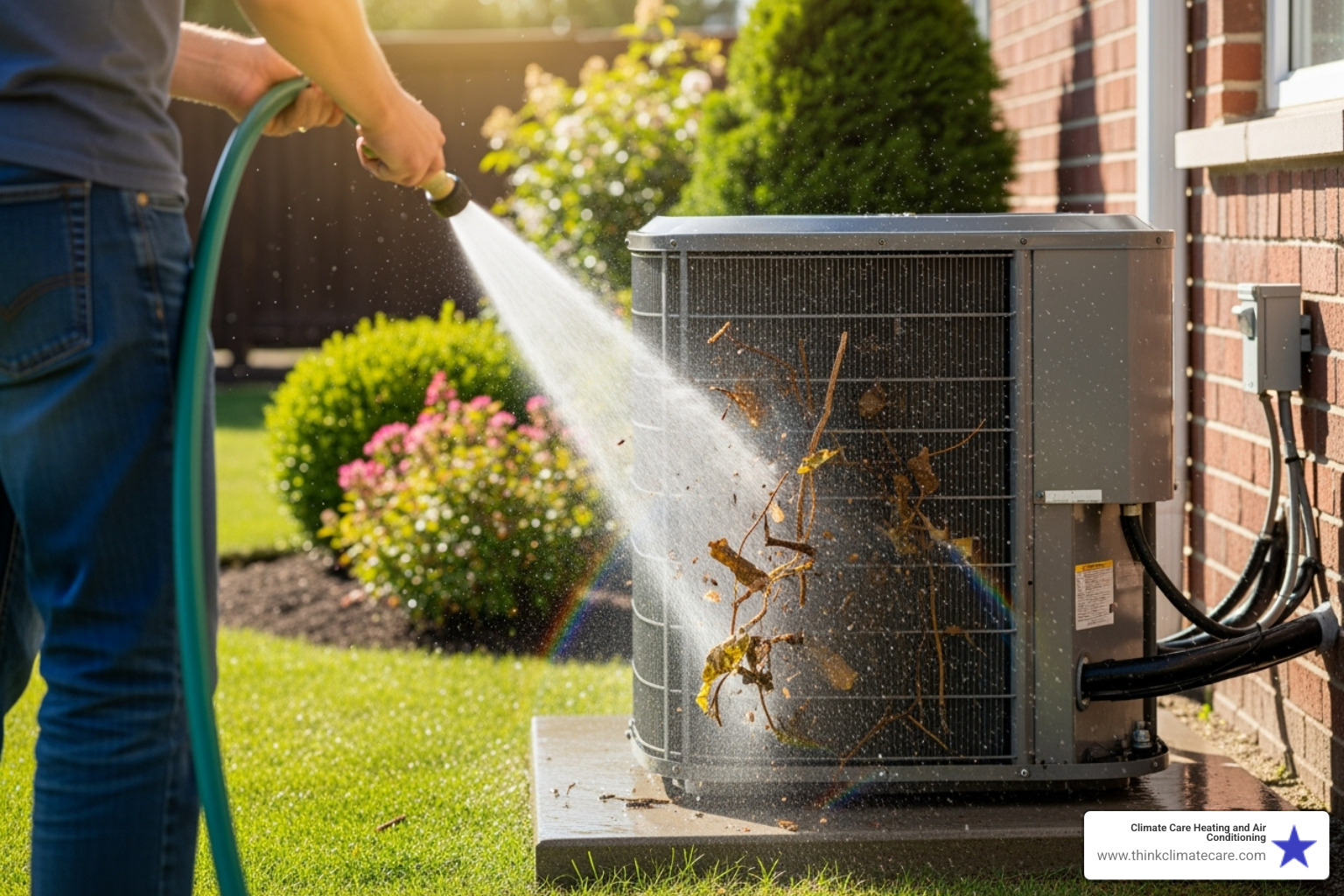
To clean the condenser coil, remove loose debris, then gently spray it with a garden hose from the inside out. Do not use a pressure washer, as it can damage the fins.
For bent fins, carefully straighten them with a butter knife or a fin comb. Work gently to avoid damaging the refrigerant tubing inside.
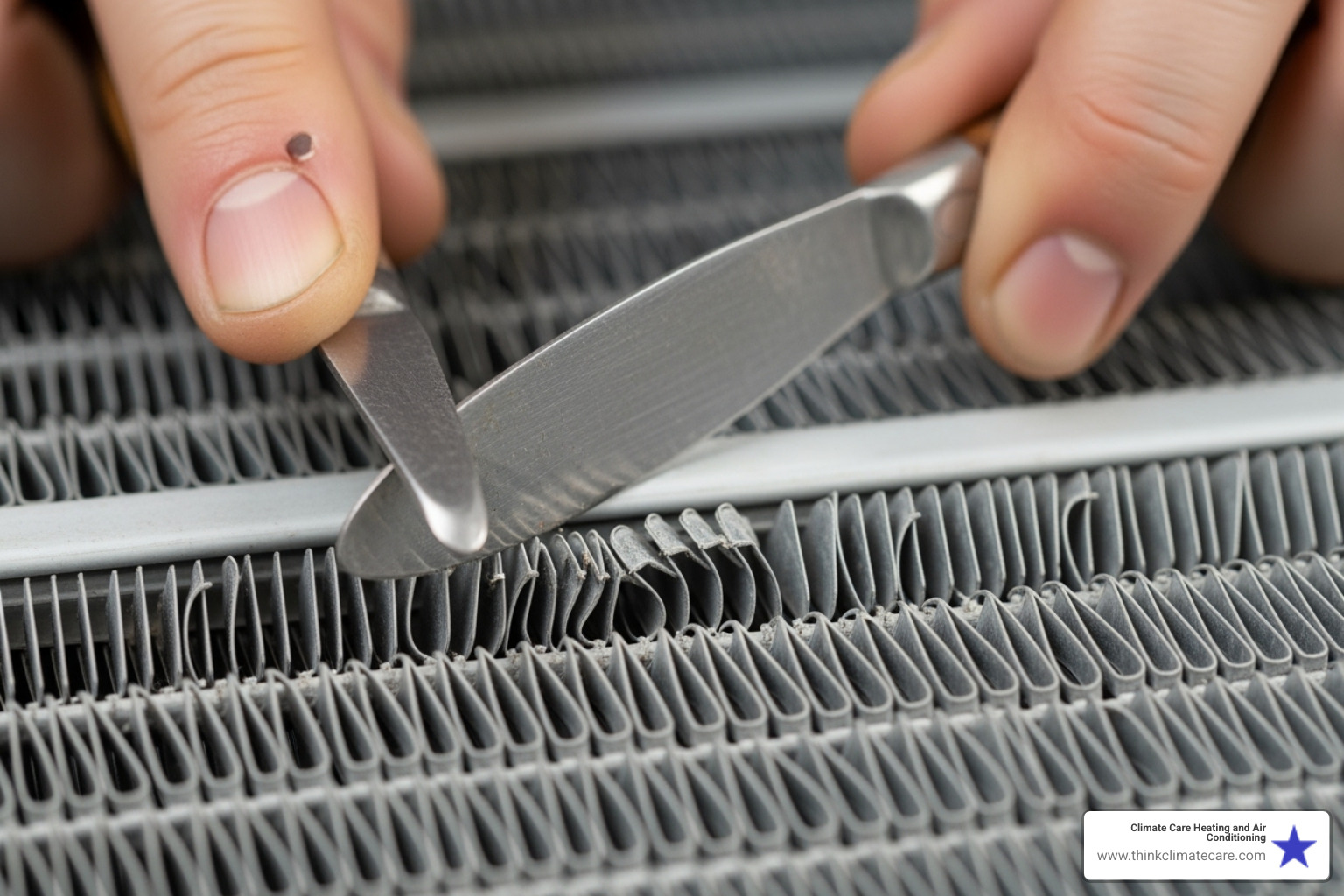
Evaporator coil cleaning requires more care. Use a soft brush for light dirt or a no-rinse coil cleaner spray. Keeping coils clean is one of the most effective ac maintenance tips. Neglecting them can lead to frozen coils, a common issue explained in our article on Why AC Coils Keep Freezing in Summer Heat.
Step 4: Unclog the Condensate Drain Line
As your AC cools, it removes moisture from the air. This water flows through the condensate drain line. If this line clogs with algae or dirt, water backs up, potentially causing water damage and high humidity. Many systems have a safety switch that shuts the AC off if the drain pan overflows.

To clear a minor clog, find the PVC drain line from your indoor unit and pour a cup of distilled white vinegar down the access opening. Let it sit for 30 minutes, then flush with water. For tougher clogs, use a wet/dry vacuum at the exterior drain exit to suction out the blockage. This simple ac maintenance tip prevents expensive water damage. Learn more in our guide to AC Drain Line Clogs: Preventing Water Damage.
Step 5: Simple ac maintenance tips for your outdoor unit
Your outdoor condenser unit needs regular attention to stay efficient.
- Clear away debris like leaves and grass clippings from around the unit.
- Maintain at least 24 inches of clearance in all directions by trimming back shrubs and branches. Good airflow is essential for releasing heat.
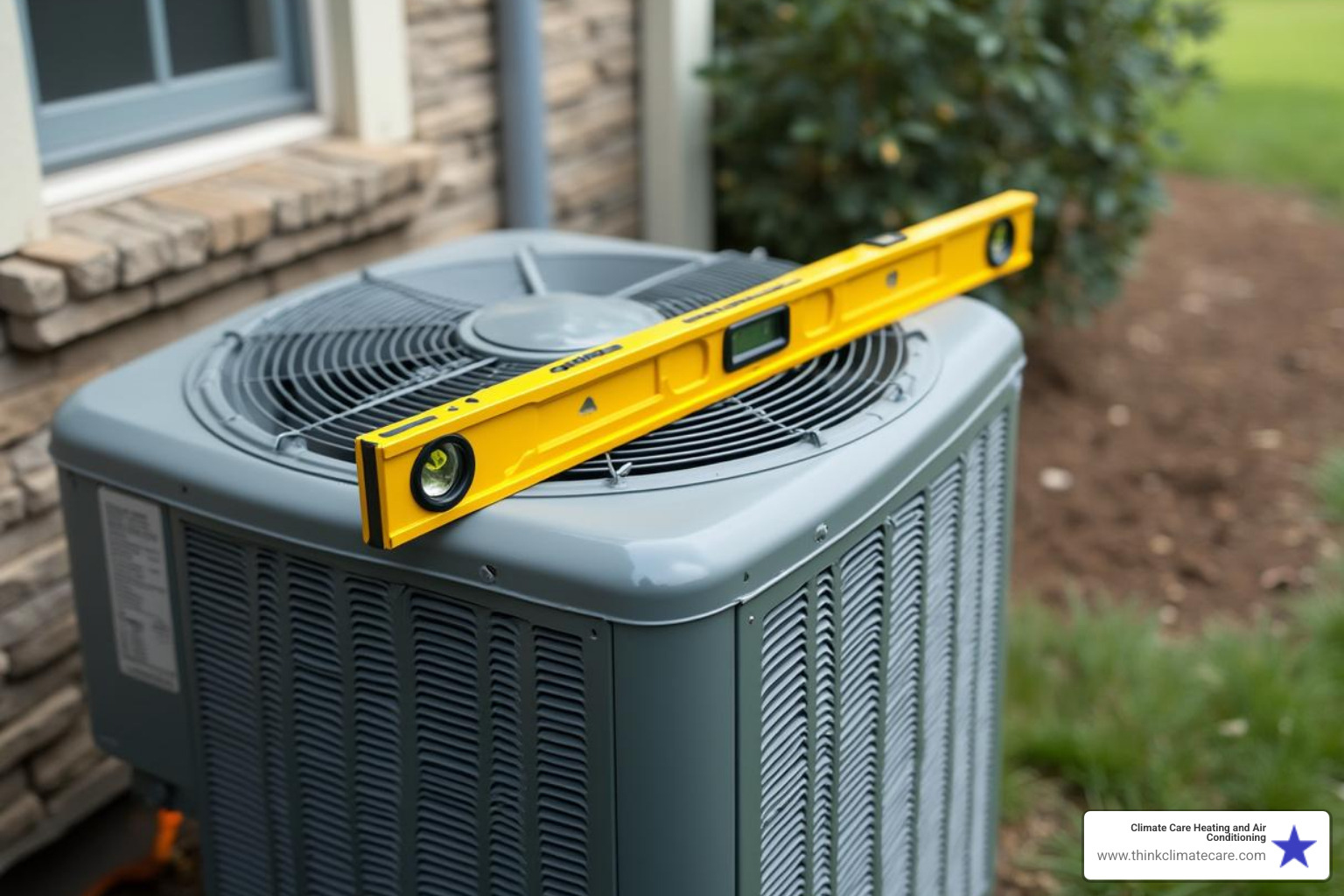
- Check that your unit is level. A tilted unit can stress the compressor and refrigerant lines. Use composite shims to level the pad if it has settled. (Heat pumps may have a slight slope away from the foundation for drainage).
- Prepare your unit for winter. Cover central AC units to protect them from debris. Never cover a heat pump, as it runs in winter. Remove and store window units indoors if possible, or use a weather-resistant cover.
These ac maintenance tips for your outdoor unit extend its life and maintain peak efficiency. For more details, see our guide to Everything You Need to Know About AC Condensers.
Maximizing Efficiency and Comfort
Smart ac maintenance tips go beyond cleaning. Combining maintenance with smart technology and home improvements will maximize comfort and savings.
The Role of Your Thermostat
Your thermostat controls your AC system. Using it wisely has a major impact on your energy bills.
- Programmable thermostats automatically adjust temperatures to your schedule, so you aren't cooling an empty house.
- Smart thermostats learn your habits, can be controlled remotely via smartphone, and may even use weather forecasts to optimize performance.
Proper thermostat management can significantly reduce cooling costs. For ideal temperature settings, aim for 78°F when you're home in the summer and 82-85°F when you're away. Every degree you lower the temperature below 78°F can increase energy use by 3-5%. If you're considering an upgrade, we offer expert AC Service in Sacramento CA.
Sealing Leaks and Improving Insulation
A well-maintained AC will struggle if your home leaks cool air.
- Ductwork leaks are a major source of inefficiency, losing up to 30% of cooled air. Use foil tape or duct mastic (not standard duct tape) to seal gaps at connections.
- Window seals are crucial for room air conditioners. Use foam insulation strips or weatherstripping to create a tight seal around the unit.
- Insulating ducts that run through unconditioned spaces like attics prevents cooled air from warming up before it reaches your rooms.
When buying new equipment, look at SEER (Seasonal Energy-Efficiency Ratio) for central AC and EER (Energy-Efficiency Ratio) for window units. Higher numbers mean better efficiency. For more information, the Department of Energy offers excellent resources on Air Conditioner Maintenance.
Professional HVAC Service: When to Call the Experts
While many ac maintenance tips are great for DIY, some jobs require a certified HVAC technician. Knowing when to call an expert is a smart decision for your safety, your system's longevity, and your wallet. We've seen in communities from Antelope to Elk Grove how DIY repairs gone wrong can be costly.
Advanced ac maintenance tips: When to call a professional
Your AC will often signal when it needs professional help. Watch for these warning signs:
- Rising energy bills: If your costs increase without a change in usage, it could signal an efficiency problem like a refrigerant leak.
- Temperature inconsistencies: Hot and cold spots suggest issues with airflow or refrigerant levels.
- Strange noises: Grinding, squealing, banging, or hissing sounds point to mechanical failures or refrigerant leaks that need immediate attention.
- Unusual odors: A musty smell can mean mold, but a burning or electrical odor is a serious fire hazard. Turn off the system immediately and call for service.
- System behavior problems: An AC that won't start or cycles on and off constantly (short cycling) indicates electrical or internal issues.
- Persistent water leaks: If clearing the drain line doesn't stop leaks, you may have a cracked drain pan or a frozen coil, requiring professional repair to prevent water damage.
- Suspected refrigerant leaks: Handling refrigerant requires certification and specialized equipment. Never attempt to add it yourself.
Don't wait for these small problems to become expensive disasters. Learn more from our guides on 10 Indicators You Need Professional AC Repair and Why AC is Not Cooling Properly.
What a Professional Tune-Up Includes
A professional tune-up is far more comprehensive than DIY maintenance. Our certified technicians use specialized tools for tasks that are unsafe for homeowners.
A tune-up includes:
- Refrigerant Management: Precisely measuring refrigerant levels, finding and fixing leaks, and safely handling refrigerant according to environmental standards.
- Electrical System Inspection: Testing voltage, tightening connections, and checking for worn or burnt wiring to ensure safety and efficiency.
- Lubrication and Belt Maintenance: Oiling moving parts and checking fan belts to reduce friction and prevent wear.
- Deep Cleaning and Adjustment: Cleaning blower components can improve efficiency by up to 15%.
- System Sequence Verification: Ensuring the thermostat, compressor, and fans are all communicating and operating correctly.
- Thermostat Calibration: Guaranteeing accurate temperature readings to prevent wasted energy.
- Safety Inspections: Checking gas connections, burners, and heat exchangers on heat pumps and furnaces.
Professional maintenance extends your system's life and maintains its efficiency. Read more about our approach in The Importance of Regular AC Tune-Up.
Frequently Asked Questions about AC Maintenance
We often hear the same questions about ac maintenance tips from homeowners in Manteca, Sacramento, and surrounding areas. Here are answers to the most common concerns.
How often should I have my AC professionally serviced?
The golden rule is to schedule professional maintenance once a year, ideally in the spring before the cooling season begins. This allows a technician to catch small problems, perform a deep cleaning, and ensure your system is ready for the summer heat. An annual tune-up saves money by improving energy efficiency, reducing breakdowns, and extending the system's lifespan. Many manufacturers also require it to keep your warranty valid.
For heat pump owners, schedule a second visit in the fall to service the heating components, as these units work year-round.
If you're in the Stockton area, you can Schedule an AC Tune-Up in Stockton CA with our team.
What are the health benefits of a well-maintained AC?
A well-maintained AC does more than cool your home; it creates a healthier environment. Key benefits include:
- Humidity Control: A properly functioning AC removes excess moisture, which inhibits the growth of mold and mildew that can trigger allergies and respiratory issues.
- Cleaner Air: Regularly changing the air filter traps dust, pollen, pet dander, and other allergens, improving indoor air quality. Research from NC State Extension confirms that good air quality leads to better sleep and fewer allergy symptoms.
What's the difference between maintaining a central AC and a window unit?
While both need care, their maintenance differs. Understanding these differences helps you apply the right ac maintenance tips.
- Filters: Central AC filters are in the indoor air handler or a return vent. Window unit filters are easily accessible behind the front grille.
- Coils: Central systems have separate indoor and outdoor coils. Window units have both coils in one compact box.
- Drainage: Central ACs use a drain line to carry water away. Window units often drain directly outside.
- Winter Prep: Central AC outdoor units are covered (unless it's a heat pump). Window units should ideally be removed and stored indoors.
- Ductwork: Only central systems have ductwork that needs to be checked for leaks and proper insulation. Window units require a tight seal in the window to prevent air leaks.
Conclusion
Following these ac maintenance tips—from simple DIY tasks to professional tune-ups—is the key to a reliable and efficient cooling system. Regular maintenance offers compound benefits: changing a filter improves air quality and lowers energy bills, while clearing debris from your outdoor unit helps it last longer.
Proactive care always beats reactive repairs. A few minutes of upkeep each month can save you from an emergency repair bill on a sweltering summer day. Effective AC care combines your DIY efforts with the professional expertise of a certified technician who can handle complex tasks like refrigerant management and electrical diagnostics.
At Climate Care, we believe in holistic HVAC care focused on performance, cost-efficiency, and environmental responsibility. Your comfort system is a major investment, and our comprehensive membership plan offers savings and priority service to keep it running smoothly year-round.
Ready to give your AC the care it deserves? For comprehensive service that ensures peak performance and efficiency, schedule your AC Maintenance in Sacramento CA today.
We're proud to serve communities throughout California, including Antelope, Carmichael, Ceres, Citrus Heights, Elk Grove, Elverta, Escalon, Fair Oaks, Folsom, French Camp, Galt, Lathrop, Lodi, Manteca, Modesto, Mountain House, Natomas, North Highlands, Oakdale, Orangevale, Patterson, Rancho Cordova, Rio Linda, Ripon, Riverbank, Rocklin, Roseville, Sacramento, Salida, Stockton, Tracy, Turlock, and Woodbridge.
Your comfort is our commitment.
Customer Testimonials
Our customers love our service and support.












